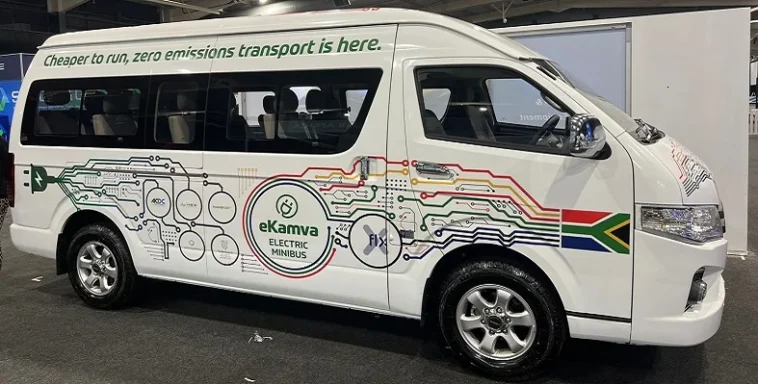South Africa has taken a significant step towards sustainable public transportation with the introduction of its first electric minibus taxi. A consortium led by GoMetro, a fleet management solutions provider, has unveiled the eKamva, a 15-seater electric vehicle designed to revolutionize the country’s taxi industry.
The name “eKamva” is derived from the Xhosa word for “future,” reflecting the project’s forward-thinking approach. This innovative vehicle is the result of collaboration between GoMetro, Powerfleet, HSW, ACDC Dynamics, and Stellenbosch University.
Justin Coetzee, CEO of GoMetro, shared impressive details about the eKamva’s performance. The electric minibus boasts a range exceeding 200 kilometers on a single charge. It can be rapidly charged within 75 minutes using a 60 kW DC charger or slowly charged overnight for 10 hours.
One of the most appealing aspects of the eKamva is its cost-effectiveness. Compared to traditional minibus taxis, it offers significant savings in operating costs, ranging from 40% to 70%. The exact savings depend on factors such as fuel prices and the specific taxi route.
To support the adoption of these electric taxis, the consortium plans to establish a network of charging stations near taxi ranks. The first two charging hubs are set to be developed at Century City and Stellenbosch taxi ranks in Cape Town within the next year.
Maintenance of the eKamva is simplified due to its electric design. Coetzee explained that the vehicle doesn’t require oil changes, air filter replacements, or spark plug maintenance. This reduction in moving parts decreases potential points of failure, enhancing reliability.
The consortium aims to integrate the eKamva into the existing minibus taxi industry infrastructure. They plan to partner with current service providers, offering training on the new technology and maintenance approaches. This strategy ensures a smooth transition to electric vehicles while utilizing established parts and service markets.
The introduction of the eKamva comes at a time when South Africa’s electric vehicle market is poised for significant growth. Projections indicate that the market revenue could reach $93.3 million by 2024. This upward trend is expected to continue, with an annual growth rate of 8.69% from 2024 to 2029, potentially reaching a market volume of $141.6 million by 2029.
Despite the promising outlook, Coetzee highlighted a challenge facing the adoption of electric taxis. Currently, South African policymakers classify electric vehicles as luxury items, resulting in import duties of 40%. This classification significantly impacts the price of the eKamva, which is expected to range from R1.1 million to R1.2 million.
Coetzee emphasized the need for policy changes to make electric taxis more affordable. He suggested that removing the luxury tax on electric minibuses could bring the price down to between R650,000 and R750,000, comparable to the cost of a Toyota Quantum, a popular conventional minibus taxi model.
The introduction of the eKamva represents a crucial step towards sustainable public transportation in South Africa. As the country grapples with environmental concerns and the need for efficient urban mobility, this electric minibus taxi offers a promising solution. The success of this initiative could pave the way for widespread adoption of electric vehicles in the public transport sector, potentially transforming the landscape of urban commuting in South Africa.
 We just launched our WhatsApp channel. Want to get the latest news from the Tech in Africa?
We just launched our WhatsApp channel. Want to get the latest news from the Tech in Africa?



